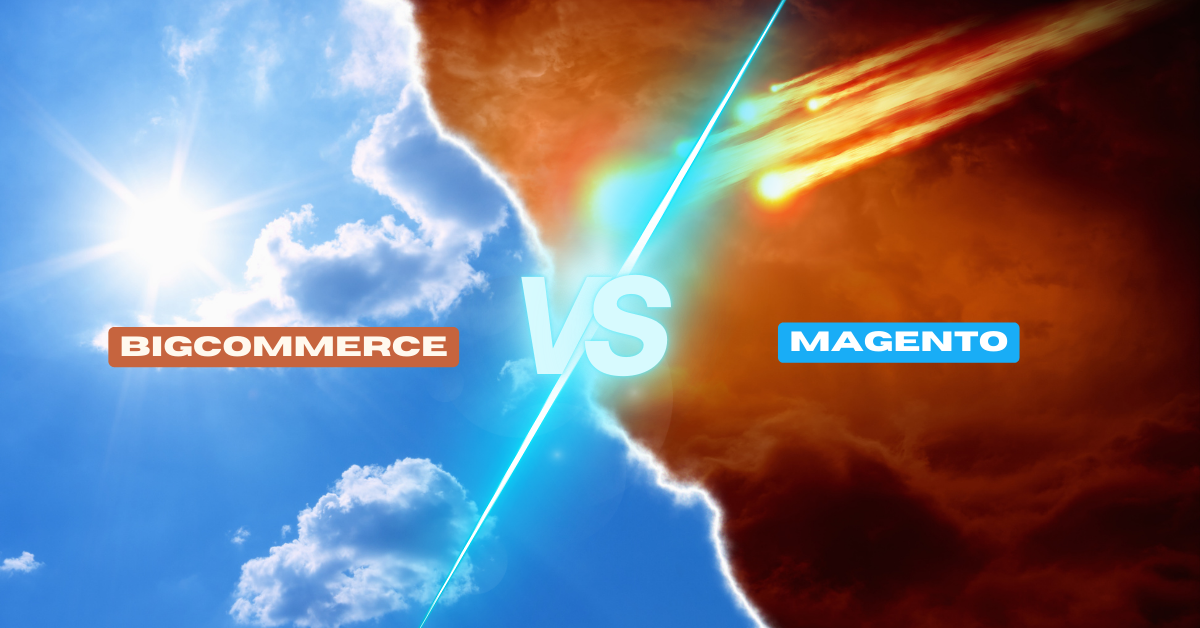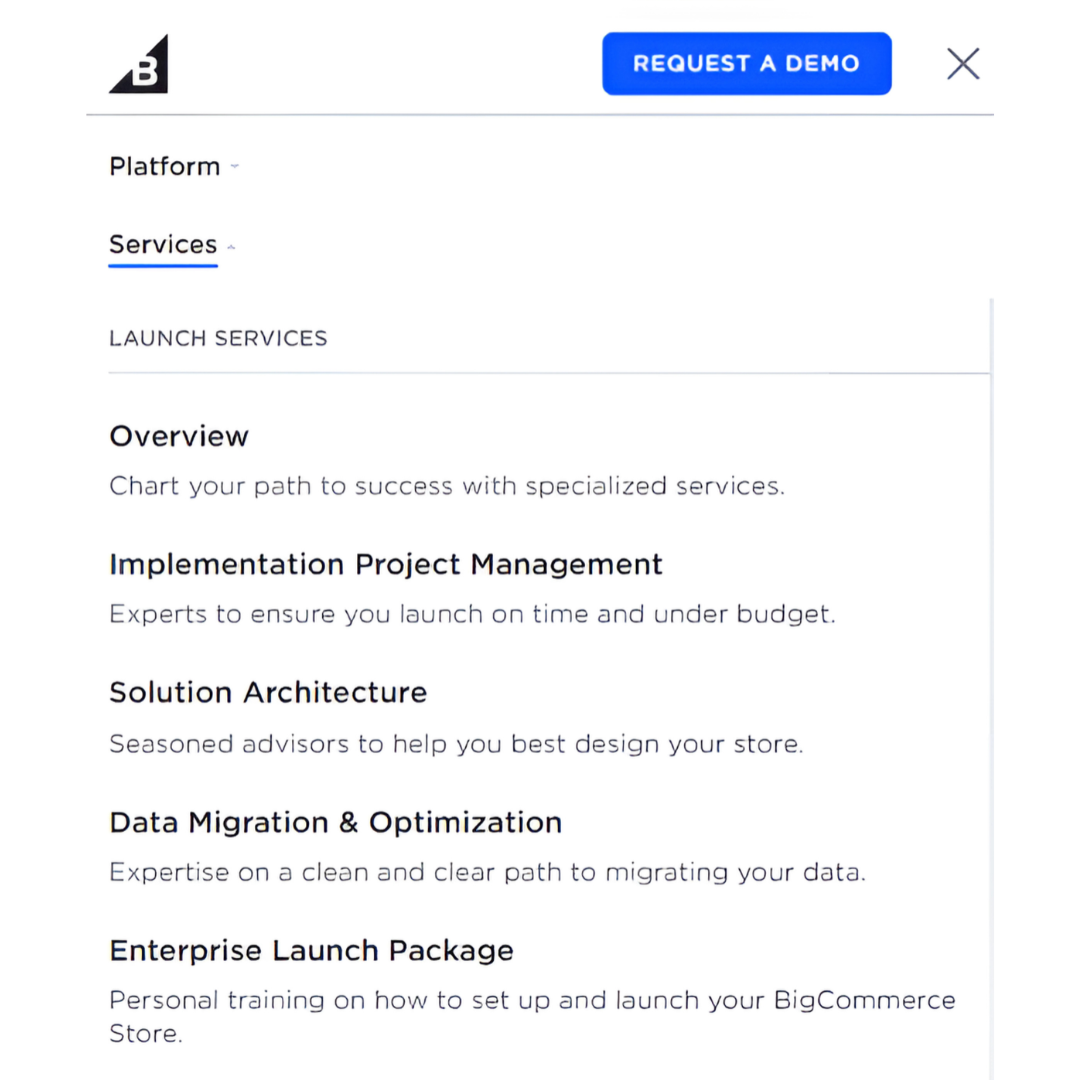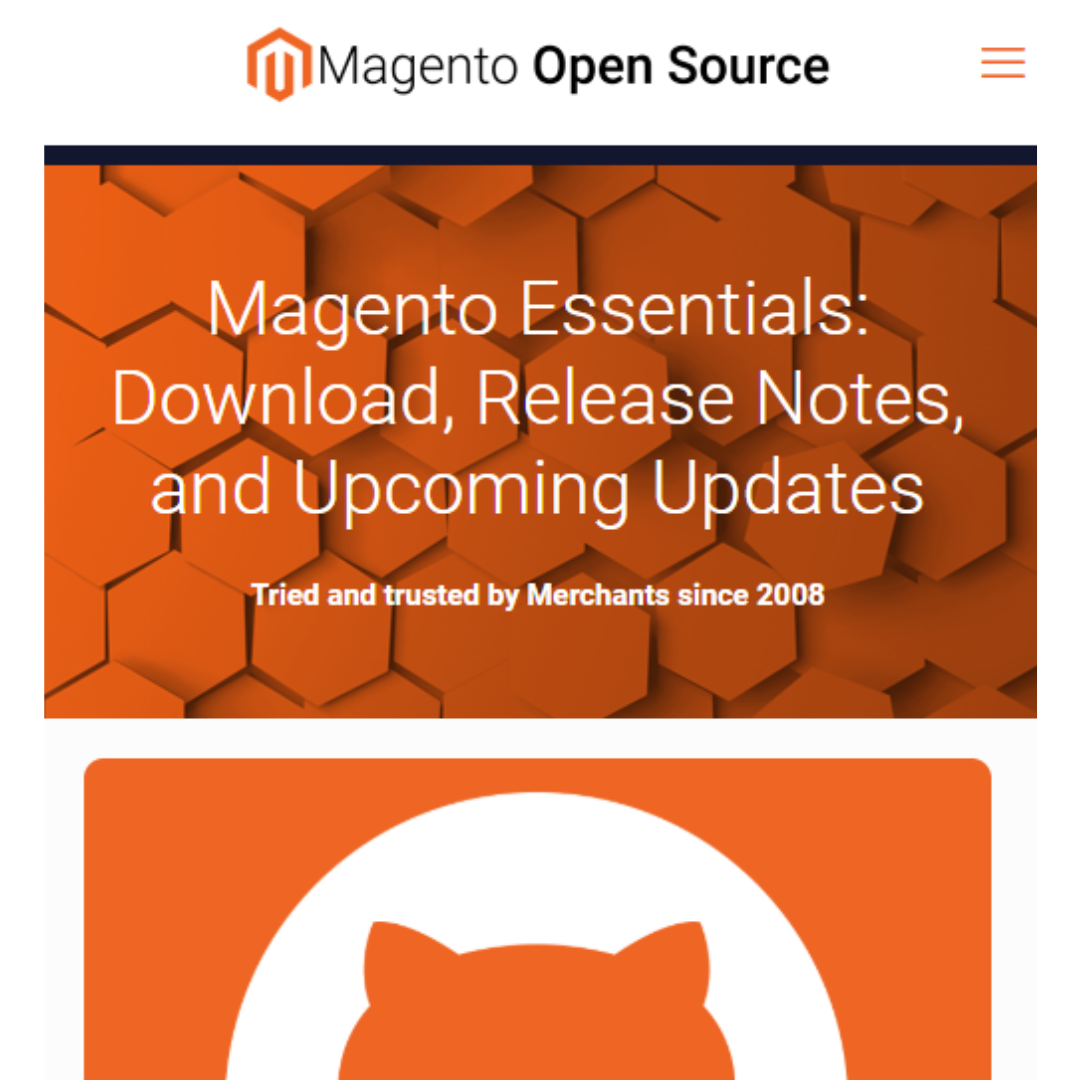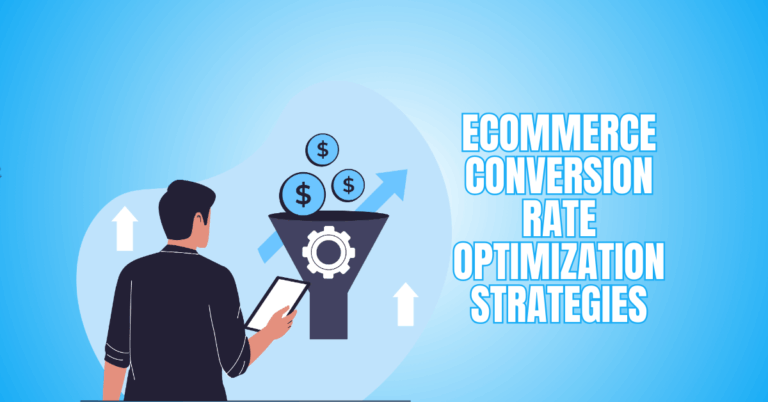BigCommerce vs Magento
BigCommerce vs Magento: The Ultimate Showdown Of Strengths And Weaknesses
Your choice of e-commerce platform can determine the success of your online business. Business owners seeking a reliable solution often debate BigCommerce vs. Magento.
While BigCommerce offers simplicity and ease of use, Magento provides unparalleled customization and scalability.
This article compares BigCommerce and Magento to help you select the best platform for your unique business needs.

What Is BigCommerce Company
BigCommerce is a leading SaaS (Software-as-a-Service) e-commerce platform founded in 2009. It empowers businesses to create, manage, and scale online stores with minimal technical expertise.
Known for its user-friendly interface, BigCommerce offers robust features such as responsive themes, SEO tools, and payment integrations, catering to small and medium-sized businesses worldwide.
The platform offers a hosted solution, meaning businesses don’t need to worry about managing servers or software updates.
Want to Start Making Money Online?
Try My #1 Recommendation Program!
BigCommerce offers online businesses an all-in-one solution with integrated marketing, analytics, and inventory management solutions. Its flexibility and functionality appeal to both beginners and experienced merchants.
BigCommerce serves diverse industries, enabling businesses to sell physical, digital, and subscription products.
With multi-channel capabilities, it integrates with platforms like Amazon, eBay, and social media. Trusted by thousands of merchants globally, BigCommerce continues to innovate, delivering scalable and cost-effective e-commerce solutions for businesses of all sizes.
What Is Magento?
Magento, now part of Adobe Commerce, is a versatile open-source e-commerce platform launched in 2008.
Renowned for its flexibility, Magento enables businesses to build highly customized online stores that cater to their unique needs.
The platform is widely used across industries, supporting everything from small startups to global enterprises, offering unparalleled scalability and adaptability.
Unlike hosted solutions like SaaS platforms, Magento requires self-managed hosting and technical expertise for setup and ongoing maintenance.
Its robust suite of features, including advanced SEO capabilities, extensive integration options, and multi-store functionality, makes it ideal for businesses seeking complete control over their e-commerce operations.
Magento offers two primary versions: the free, open-source edition and Adobe Commerce, a premium solution with enhanced features.
A global developer community widely supports both versions. Magento is particularly popular among enterprises that manage complex catalogues, international operations, and advanced customer experiences.
Key Features Comparison: BigCommerce vs Magento
A detailed comparison of BigCommerce's and Magento's key features is vital for selecting the best e-commerce platform. Both offer distinct advantages that suit various business goals and sizes.
1. Ease Of Use
BigCommerce
BigCommerce suits inexperienced and non-technical users because of its simple design and user-friendly interface.
The platform handles hosting, maintenance, and updates, eliminating the need for extensive technical knowledge.
This enables business owners to concentrate less on backend difficulties and more on operations and growth.
- Simple interface designed for beginners and non-technical users.
- The platform fully manages hosting, updates, and maintenance.
Magento
Although Magento has a steep learning curve, it is well known for its strong features. Setting up and maintaining a Magento store requires technical know-how, so companies with IT departments or access to qualified developers are better suited.
Its robust customization capabilities demand significant effort, but this trade-off enables highly tailored e-commerce experiences for advanced users.
- Demands technical skills for setup, customization, and ongoing maintenance.
- Ideal for businesses with dedicated IT teams or professional developers.
2. Customization And Flexibility

BigCommerce
BigCommerce provides several customizable themes and a range of integrations to enhance the store's appearance and functionality.
However, its flexibility is limited compared to open-source platforms, as users cannot extensively modify the backend.
This makes it a straightforward option but may restrict businesses with unique or complex customization needs.
- Offers customizable themes and multiple integrations for functionality enhancement.
- Limited backend flexibility compared to open-source platforms.
- Simplifies customization for businesses without technical expertise.

Magento
Magento is unparalleled in customization. Developers can adjust nearly every aspect of the store, from design to backend functionality, giving businesses complete control.
Although maximizing its potential necessitates substantial technical know-how and money, it is perfect for businesses with particular needs or sophisticated customization objectives.
- Supports extensive customization, from design to advanced features.
- Best for businesses with unique and complex needs.
- It provides unmatched control but requires skilled developers.
3. Scalability

BigCommerce
BigCommerce is an excellent option for small and medium-sized enterprises because it can manage stores with high traffic.
While it supports scalability to an extent, the advanced options for managing extensive operations or complex business models are limited compared to platforms like Magento, which excels in enterprise-level scaling.
- Suitable for small to medium-sized businesses and high-traffic stores.
- Limited advanced scalability for large, complex operations.
- Provides stable growth opportunities for growing businesses.

Magento
Magento is well known for its exceptional scalability, making it the perfect platform for big firms or those expanding quickly.
Its robust architecture allows seamless handling of complex product catalogues, high transaction volumes, and global operations.
Magento's ability to support multi-store setups and advanced customization ensures businesses can scale without constraints.
- Perfect for large enterprises and rapidly growing businesses.
- Handles complex catalogues, multi-store setups, and global operations efficiently.
- Designed to support massive scalability with customization options.
4. Pricing And Cost Analysis
BigCommerce
BigCommerce offers predictable, tiered pricing plans tailored to businesses of varying sizes.
The Standard plan starts at $29.95 monthly and increases to $299.95 for the Pro plan, which includes hosting and support.
Want to Find Out How To Start Your Home-Based Business?
Try My #1 Recommendation Platform!
However, additional transaction fees may apply depending on the payment gateway, which could add to the overall cost.
- Tiered pricing from $29.95 to $299.95 per month.
- Includes hosting and support in the pricing.
- Extra transaction fees may be charged depending on the payment gateway.
Magento
Magento's open-source version is free, making it a cost-effective option for developers or businesses with technical expertise. However, hosting, development, and ongoing maintenance expenses can add up.
The premium version, Adobe Commerce, costs $22,000 annually and provides advanced enterprise features. However, it requires a significant financial commitment.
- A free, open-source version is available, but hosting and maintenance come with additional costs.
- Adobe Commerce starts at $22,000 per year.
- Suitable for businesses with a budget for high customization and scalability.
5. SEO And Marketing
BigCommerce
BigCommerce simplifies website improvement by integrating SEO features like mobile-responsive designs, meta descriptions, and customizable URLs.
The platform also supports various marketing integrations, including Google Ads and social media platforms, enabling seamless promotion.
These features make BigCommerce a practical choice for businesses aiming for solid online visibility.
- Built-in SEO features like customizable URLs and mobile responsiveness.
- Supports marketing integrations such as Google Ads and social media.
- Simplifies online visibility for businesses without technical expertise.
Magento
Magento stands out with advanced SEO capabilities, allowing businesses to implement custom strategies.
Developers can modify site architecture, metadata, and URLs to achieve superior search rankings. This customization potential provides a competitive edge, especially for businesses in highly competitive industries.
- Advanced SEO features for custom strategies and superior ranking potential.
- Developers can optimize site structure and metadata effectively.
- It is ideal for businesses needing tailored marketing approaches.
6. Third-Party Integrations And Extensions
BigCommerce
BigCommerce offers a robust app marketplace with various integrations to enhance functionality, including payment gateways, shipping solutions, and marketing tools.
Are You Tired Of Scams?
Want to Start Making Money Online?
While the selection is comprehensive, it is not as extensive or flexible as Magento’s offerings. This makes it suitable for businesses seeking straightforward integrations but limits advanced customization options.
- Provides a reliable app marketplace with essential tools and services.
- Includes popular integrations for payments, shipping, and marketing.
- Limited compared to the extensive flexibility of open-source platforms.
Magento
Magento excels in third-party integrations with a vast library of extensions that can add nearly any feature a business requires.
Its open-source nature allows seamless compatibility with diverse tools, enabling companies to create highly customized solutions. This flexibility makes Magento a top choice for complex e-commerce operations.
- Offers an extensive range of extensions for advanced functionality.
- Works seamlessly with a variety of third-party tools and services.
- Perfect for businesses needing tailored solutions and advanced integrations.
7. Support And Community
BigCommerce
BigCommerce offers live chat around the clock to promptly address user concerns. The software also offers courses and a comprehensive knowledge library to help with learning and troubleshooting.
These resources make BigCommerce highly accessible and user-friendly for businesses with minimal technical expertise.
- 24/7 support is available through live chat, email, and phone.
- Comprehensive knowledge base and tutorials for troubleshooting.
- It is ideal for businesses seeking consistent and accessible customer assistance.
Magento
Magento relies heavily on its active community and detailed support documentation. Developers can find solutions through forums, guides, and online resources.
Professional support is available for Adobe Commerce users but comes at a higher cost, making it suitable for businesses with dedicated budgets for advanced support.
- Active community and extensive documentation for problem-solving.
- Professional support is available for Adobe Commerce users.
- It is best for businesses with in-house developers or a dedicated budget.
8. Security And Compliance
BigCommerce
With built-in capabilities that require little user configuration, BigCommerce prioritizes security and compliance.
It is PCI-compliant to safeguard consumer data, adheres to industry regulations, and has SSL certifications to guarantee encrypted transactions.
By offering automatic updates and secure payment gateways, BigCommerce provides merchants and customers with a reliable and safe shopping experience.
- Built-in SSL certificates ensure secure transactions.
- PCI compliance is included to safeguard customer data.
- Minimal effort is required from users to maintain security.
Magento
Thanks to Magento's comprehensive security features and customizable settings, businesses can customize security measures to meet their needs.
However, implementing these measures requires technical expertise. Users must manually configure SSL certificates and ensure their setup complies with PCI standards. Moreover, frequent updates and patches are necessary to safeguard against vulnerabilities.
- Customizable security settings provide flexibility but require technical skills.
- SSL certificates and PCI compliance must be configured manually.
- Frequent updates are vital for ensuring security and compliance.
9. Use Cases And Business Suitability
BigCommerce
BigCommerce is ideal for small—to medium-sized businesses looking for a user-friendly, scalable eCommerce solution.
It offers several integrated services, including delivery choices, payment integrations, and SEO tools.
Want To Learn How To Create Your Own Website And Online Business?
Try My #1 Recommendation Training And Hosting Platform!
With its cloud-based platform, it’s well-suited for merchants who prioritize ease of use, cost-effectiveness, and reliability without needing advanced technical expertise.
When to choose BigCommerce:
- Small-to-medium businesses.
- Need for quick setup and low technical involvement.
- Budget-friendly options with predictable costs.
Magento
Large companies with intricate eCommerce needs are the target market for Magento. It offers extensive customization and scalability and supports diverse product catalogues, complex workflows, and high-traffic volumes.
It’s perfect for companies that need flexibility, control, and advanced features, but it requires more technical resources for setup and maintenance.
When to choose Magento:
- Enterprises or businesses with unique customization needs.
- Experienced developers or a budget for technical teams.
- Businesses anticipating rapid growth or global expansion.
Pros And Cons: BigCommerce vs Magento
BigCommerce and Magento offer distinct advantages and challenges. By understanding their advantages and disadvantages, businesses may choose the best eCommerce solution based on their needs and the available resources.
Pros Of BigCommerce
BigCommerce offers a user-friendly eCommerce solution with scalability and built-in features for businesses.
User-Friendly Interface
BigCommerce's user-friendly design allows small businesses and entrepreneurs to establish and run online stores without extensive technical know-how.
The intuitive interface and drag-and-drop features simplify store setup, product listings, and day-to-day management tasks, making it accessible to non-tech-savvy users.
Cost-Effective With Included Hosting
BigCommerce’s pricing structure is cost-effective. It offers various plans that include hosting, security, and scalability.
This reduces the need for separate hosting fees or additional technical support costs, making it an attractive option for businesses with budget constraints. The all-in-one pricing model ensures ease of management.
Ideal For Small To Medium Businesses
For small to medium-sized enterprises in need of an innovative e-commerce solution, BigCommerce is the perfect choice.
It provides robust built-in features like payment integrations, SEO tools, and shipping options, allowing companies to grow without complex customization or extensive development work. This makes it ideal for entrepreneurs looking for efficiency.
Cons Of BigCommerce
Despite its advantages, BigCommerce has limitations that may not suit every business's needs.
Limited Customization Options
While BigCommerce offers a range of built-in features, it is limited in deep customization. Businesses requiring highly personalized or complex functionalities may find this restrictive.
Customizing themes and features often requires third-party apps or additional development work, which can increase costs and complexity.
Transaction Fees On Lower Plans
BigCommerce charges transaction fees on its lower-tier plans unless using its preferred payment gateway.
This might be a major disadvantage for companies dealing with many transactions. Because of these fees, BigCommerce is less cost-effective for some users than other platforms. The costs can mount up quickly and raise operating expenses.
Limited App Marketplace
BigCommerce has many integrations, but it is smaller than competitors like Shopify or Magento. Certain unique features may require custom development or outside solutions, which can be expensive and time-consuming.
This may impact businesses that need more advanced or niche integrations to meet their specific needs.
Pros Of Magento
Magento offers powerful customization options and advanced features for businesses with complex needs.
Highly Customizable And Flexible
Magento provides unparalleled flexibility, allowing businesses to customize virtually every aspect of their online stores.
The open-source technology will enable merchants to customize the platform to meet their demands regarding functionality, design, and integrations, making it perfect for companies with particular requirements.
Best For Large-Scale And Enterprise-Level Businesses
Magento is built to handle high traffic, extensive product catalogues, and complex business models, making it perfect for large enterprises.
Its scalability supports businesses that need to grow without facing significant platform limitations, offering robust tools to manage various stores, customers, and transactions efficiently across multiple locations.
Extensive Extensions And Third-Party Integrations
Magento's marketplace offers thousands of extensions and integrations, providing additional functionalities for everything from marketing to shipping.
This comprehensive library allows businesses to quickly add features like payment gateways, CRM systems, and inventory management, helping them meet specific operational needs without building everything from scratch.
Cons Of Magento
While Magento offers robust features, it also comes with specific challenges that businesses must consider.
Requires Technical Expertise
Magento is a powerful platform but demands technical expertise for installation, customization, and ongoing maintenance.
The system's complexity means businesses often need skilled developers to manage and update their stores, making it less accessible for merchants without a dedicated technical team.
Higher Hosting, Development, And Maintenance Costs
Magento can be expensive. Hosting requirements for high-performance stores can be costly, especially for large businesses.
Additionally, the need for developers to customize and maintain the platform adds significant ongoing expenses, making it a less cost-effective solution for smaller companies.
Steeper Learning Curve
Magento's advanced features and customization options make it more difficult to understand than competing eCommerce platforms.
New users or businesses without a technical background may find it challenging to navigate the system, requiring additional time and resources for training or hiring specialized staff.
Conclusion
In conclusion, the choice between BigCommerce and Magento depends on your business requirements.
BigCommerce suits area malls and medium-sized businesses seeking affordability and simplicity, while Magento excels for enterprises needing advanced customization and scalability.
To position your e-commerce business for long-term success, choose the platform that aligns with your goals, budget, and skills. Assess your objectives and technical capabilities to make the best decision.
I trust you enjoyed this article about BigCommerce vs Magento: The Ultimate Showdown Of Strengths And Weaknesses. Please stay tuned for more articles. Take care!
JeannetteZ
Want to Learn How to Build Your Own Home-Based Online Business And Start Making Money Online From Your Comfortable Couch?
Try Wealthy Affiliate!
Your Opinion Is Important To Me
Do you have thoughts, ideas, or questions? I would love to hear from you. Please leave me your questions, experiences, remarks, and suggestions about BigCommerce vs Magento: The Ultimate Showdown Of Strengths And Weaknesses in the comments below. You can also email me at Jeannette@WorkFromAnywhereInTheWorld.com.
Disclosure
This post may contain affiliate links. I earn from qualifying purchases as an Amazon Associate and other affiliate programs. Please read my full affiliate disclosure.
You may also enjoy the following articles:
Wealthy Affiliate Coupons For Premium Memberships
Wealthy Affiliate Review – Scam or Legit? The Truth Exposed
An Insider Wealthy Affiliate Review
Facebook vs Instagram Ads: A Marketer’s Ultimate Guide To Success







